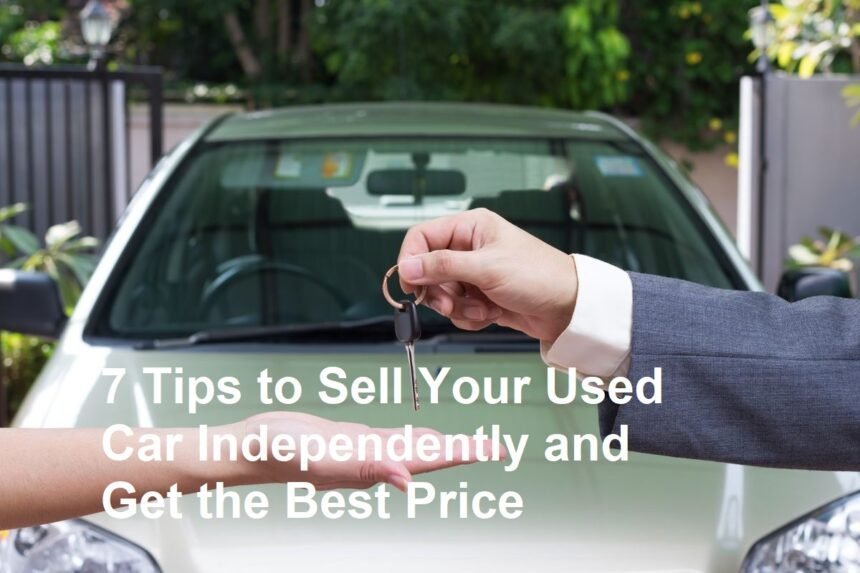Introduction
Selling your used car can feel overwhelming. Many people immediately think of trading it in at a dealership or using a middleman, but did you know that selling your car independently often means getting a much higher price? Of course, it comes with its own set of challenges—but with the right approach, you can maximize your profit.
In this article, we’ll break down 7 tips to sell your used car independently and get the best price, explain the reasons why selling a used car on your own is often better, and uncover the common challenges you might face along the way.
Why Sell Your Used Car Independently?
Before diving into the tips, let’s talk about the main reasons why people choose to sell their car without a middleman.
Key Benefits:
- Higher profits: Dealers often buy low and resell high. By cutting out the middleman, you keep more money in your pocket.
- More control: You set the asking price, decide how to market it, and negotiate directly with buyers.
- Personal satisfaction: Closing a deal on your own gives you confidence and peace of mind.
If you’re willing to put in a little extra effort, selling independently can be absolutely worth it.
1. Research Your Car’s Market Value
The first step to getting a high price is knowing what your car is actually worth.
How to Do It:
- Check online platforms like classifieds, car marketplaces, or even social media listings.
- Compare cars of the same model, year, mileage, and condition.
- Consider unique selling points (e.g., upgraded sound system, low mileage, or one-owner history).
Pro tip: Don’t underprice your car out of fear. Start slightly above the average market value—this leaves room for negotiation.
2. Prepare and Clean Your Car
First impressions matter, and this applies to cars too.
Things to Do Before Listing:
- Wash and wax the exterior for a shiny finish.
- Vacuum and detail the interior.
- Fix small cosmetic issues (e.g., scratches, broken lights, or missing knobs).
A well-presented car signals to buyers that you’ve taken good care of it, which can justify a higher asking price.
3. Gather Important Documents
Nothing scares buyers away faster than missing paperwork.
Documents to Prepare:
- Vehicle registration and title.
- Maintenance and service records.
- Emissions or inspection certificates (if required in your country).
Having all documents ready builds trust and makes the selling process smoother.
4. Write a Strong, Honest Listing
Your online listing is your sales pitch—make it count.
What to Include:
- High-quality photos from multiple angles (interior and exterior).
- Clear details: year, mileage, condition, features, and any upgrades.
- Honest description: mention both strengths and minor flaws to avoid future disputes.
Tip: Highlight the benefits of your car. For example: “Perfect for city driving with great fuel economy” or “Spacious SUV ideal for families.”
5. Be Smart About Pricing and Negotiation
Pricing your car is one thing, but knowing how to negotiate is another.
Practical Advice:
- Set your asking price slightly higher than your lowest acceptable amount.
- Be polite and firm—buyers respect confidence.
- Don’t rush into the first offer unless it meets your expectations.
Remember, negotiation is part of the process. Stay calm, professional, and focused on your goal.
6. Market Your Car in the Right Places
Your car won’t sell if people don’t know about it.
Where to Advertise:
- Popular online marketplaces and car-selling platforms.
- Social media groups dedicated to buying and selling vehicles.
- Local community boards or even word-of-mouth.
The more visibility your car gets, the better your chances of finding the right buyer at the right price.
7. Stay Safe During the Sale
One of the common challenges when selling a used car independently is safety. Meeting strangers and handling large sums of money can feel risky.
Safety Tips:
- Meet buyers in a public place, preferably during the day.
- Bring a friend or family member with you.
- Accept secure payments (bank transfers or verified checks) instead of large amounts of cash.
- Keep personal information private until you trust the buyer.
By being cautious, you protect yourself while ensuring the sale goes smoothly.
Common Challenges When Selling a Used Car Independently
It’s not all smooth sailing—here are some typical obstacles you might face:
- Time-consuming process – From cleaning, listing, and responding to inquiries, it takes effort.
- Dealing with unserious buyers – Expect a few “lowball” offers or last-minute cancellations.
- Negotiation pressure – Some buyers will push hard for discounts.
- Safety concerns – Meeting strangers and handling money requires extra caution.
The good news? With patience and preparation, all these challenges can be managed.
Conclusion
Selling your car independently might take a little extra work, but the reward is often worth it. By following these 7 tips to sell your used car independently and get the best price—from researching the market to ensuring safety—you’ll not only maximize your profit but also gain full control over the process.
Remember, the key advantages of selling without a middleman are higher profits, more control, and personal satisfaction. And while there are challenges, the strategies above can help you handle them with confidence.
Have you ever sold your used car independently? Share your experience in the comments below—what worked, what didn’t, and what tips would you give to others!












